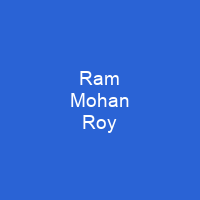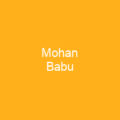Raja Ram Mohan Roy was one of the founders of the Brahmo Sabha. He was given the title of Raja by Akbar II, the Mughal emperor. His influence was apparent in the fields of politics, public administration, education and religion. Known for his efforts to abolish the practices of sati and child marriage.
About Ram Mohan Roy in brief

Between 1796 and 1797, Carey made contact with Ram Mohavagavagan Roy, who wished to learn English. He learnt the case for Christianity in a cultural context in a bid to argue the case to better understand it. He also learnt the Buddhist and Jain religious works in a context of a better cultural context. His first wife died early. He had two sons, Radhaprasad in 1800, and Ramaprasad in 1812 with his second wife, who died in 1824. Roy’s third wife outlived him. The nature and content of his early education is disputed. One view is that he started his formal education in the village pathshala where he learned Bengali and some Sanskrit and Persian. Later he is said to have studied Persian and Arabic in a madrasa in Patna and after that he was sent to Benares to learn the intricacies of Sanskrit and Hindu scripture, including the Vedas and Upanishad. The dates of his time in both these places are uncertain. It is believed that he is believed to have been sent to Patna when he was nine years old and two years later he went toBenares. His great grandfather Krishnakanta Bandyopadhyay was a Rarhi Kulin Brahmin. His father, Ramkanta, was a Vaishnavite, while his mother, Tarini Devi, was from a Shaivite family. He was a great scholar of Sanskrit, Persian and English languages and also knew Arabic, Latin and Greek.
You want to know more about Ram Mohan Roy?
This page is based on the article Ram Mohan Roy published in Wikipedia (as of Jan. 03, 2021) and was automatically summarized using artificial intelligence.







